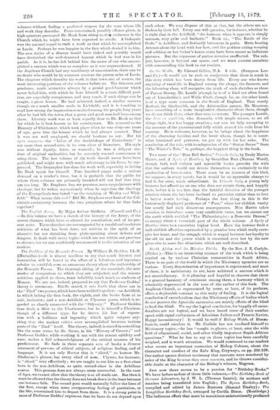On the Wolds. By Edward Gilliat, M.A. 3 vole. (Sampson
Low and Co.)—It would not be rash to conjecture that there is much in this story which has been drawn from life. Every one who knows anything of rural life in England among the clergy, the farmers, and the labouring class, will recognise the truth of such sketches as those of Parson Strong, Mr. Lendit (though he is of a kind not often found out of Lincolnshire), and Willie Croft, though he, on the other hand, is of a type more common in the South of England. That sturdy Radical, the blacksmith, and the Aristotelian parson, Mr. Mesotese, have something of a more imaginative character about them, though we do not think them other than true to nature. The younger Lendit, the deus ex mach ina, who descends, with ample means, to set all things right, is a less happy creation ; nor can we help excepting to the account of the preternatural folly which caused his exile from his country. He is welcome, however, as he brings about the happiness of the charming heroine, and the lover whom, though he is some- what irrational and perverse, we put up with for her sake. The conclusion of the tale, with its adaptation of the " Statue Scene" from " The Winter's Tale," is, perhaps, the happiest thing in the book.
Two more of the "Blue Bell Series," Friends Only, by Emily Marion Harris, and A Sp,.iy of Heather, by Geraldine Butt (Marcus Ward), though both well written and agreeable books, provoke the wish that the authors would not devote themselves so exclusively to the production of love-stories. There must be an interest of this kind,. we suppose, in every novel ; but it would be an agreeable change to find it, for once, made subordinate. In Friends Only, a young lady bestows her affections on one who does not return them, and happily finds, before it is too late, that the faithful devotion of the younger admirer whom she has been inclined to patronise rather than to love is better worth having. Perhaps the best thing in this is the humorously displayed penitence of " Puss," when her childish vanity has nearly had such disastrous consequences. Miss Harris takes occasion to introduce some very creditable verse, but we cannot see the merit which entitled "The Philanthropist : a Domestic Drama,' to occupy about a twentieth part of the whole volume. A Sprig of Heather rises to a somewhat higher level. Here the heroine finds a half-childish affection superseded by a genuine love which really occu- pies her heart, and the struggle which is waged between her loyalty to the old tie and the power which is exercised over her by the new gives rise to some fine situations, which are well described.


































 Previous page
Previous page